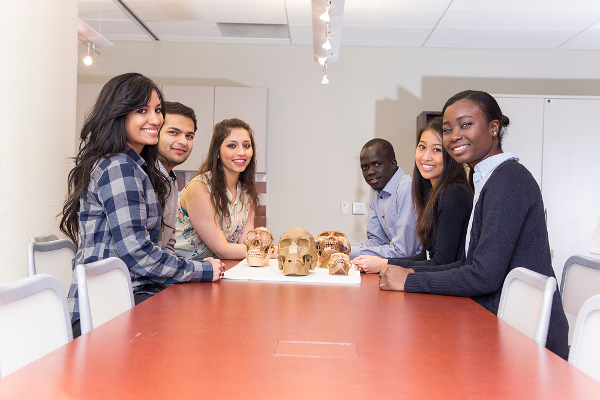(Header image: Monkey Hill, Tambon Ratsada, Thailand; photo by Andre Mouton)
The following program requirements are based on the 2024–2025 Arts and Science Calendar. You must follow the program requirements of the year that you enrolled in the program. Program requirements from previous years can be found in previous Calendars.
PROGRAMS: Enrolment in the Specialist, Major and Minor programs is limited to students that meet the admission requirements. Please note that the admission requirements vary by program. See below for the admission requirements. Students may enrol at the end of First Year or at any later time if they meet the admission requirements.
ANT courses are those offered with the following prefixes: ANT, ARH, INS, JAA, JAL, JAR and JGA
Course: Full (Y) courses or equivalent in Half (H) courses. ; , = AND / = OR
Anthropology (General - Arts Programs)
Anthropology (Society, Culture, and Language - Arts Programs)
Anthropology (Medical Anthropology - Arts Programs)
Anthropology (Evolutionary - Science Program)
Minor in Environmental Anthropology (Arts program)
Anthropology (General - Arts Programs)
- Program Description and Objectives
- Curriculum and Program Delivery
- Major Requirements
- Minor Requirements
Program Description and Objectives for Anthropology (General)

The Anthropology Major and Minor (General) programs are aimed at students who seek a broad understanding of the origins, patterns, and dimensions of human development and diversity.
Students in the programs will have the opportunity to experience the full breadth of anthropological scholarship on the human past, human evolution, and human languages, societies and cultures. While offering a broad introduction to the discipline as a whole, the programs also encourage students to develop expertise in fields of anthropological scholarship that transcend subdisciplinary boundaries. These programs will appeal to students who wish to develop a multi-dimensional anthropological approach to topics such as: health and disease, sex and gender, urban development, technology and society, material cultures, and the human environment nexus.
The Major and Minor programs in Anthropology (General) aim to provide students with an education in “four-field anthropology” that meets the highest academic standards and allows them to develop their capacities to think clearly and critically, take account of a range of scholarly perspectives, make sound judgments, and contribute constructively to society.
Curriculum and Program Delivery for Anthropology (General)
Courses in the program are clustered into three areas of study: Archaeology, Evolutionary Anthropology, and Society, Culture and Language (SCL). In their first two years, students take introductory and foundational courses in the discipline and a selection of its substantive areas. In these years they will acquire a thorough understanding of the scope of anthropology and its centrality to understanding the origins, patterns, and dimensions of human development and diversity. They will also learn the core concepts, theories and methodologies of Anthropology as developed in at least two areas of subdisciplinary research. Students in the Major will take a foundational course in SCL and either Evolutionary Anthropology or Archaeology. Those in the Minor can choose from subdisciplinary foundational courses.
In their third and fourth years, students in the Major are encouraged to delve deeply into one of the subdisciplinary areas of study, while retaining a concentration in another area. Through in-depth exposure to two sub-disciplines, students will gain a critical appreciation for, and a practical capacity to engage in multi-disciplinary analyses involving both scientific and social scientific methodologies. Students in the Minor are given the flexibility to take any upper-level courses they choose, providing they build upon the foundational courses they have already taken.
Major Requirements for Anthropology (General)
(6.5 credits)
This is a limited enrolment program. All students who request the program and obtain at least the specified mark(s) in the required course(s) will be eligible to enrol.
Courses for admission: ANT100Y1 or ARH100Y1 or ANT203Y1 or ANT204H1 or ANT207H1 with a final mark of at least 65%.
First and/or Second Year
1. ANT100Y1
2. ANT207H1
3. 1.0 credit from ARH100Y1, ANT203Y1
4. 0.5 from ANT204H1, ANT205H1 ANT208H1, ANT210H1, ANT215H1, ANT253H1
Upper years
5. 2.5 credits at the 300+ level from either Group A or Group B, or Group C, Subgroup C(i), (ii), including at least one 0.5 credit at the 400-level.
6. 1.0 additional credit from a Group other than that used to meet requirement #5
Focus in Medical Anthropology (Major: General)
Description:
This focus enables students in the Anthropology Major (General) ASMAJ1775 to identify courses pertaining to Medical Anthropology across the discipline’s social science and science fields and receive formal acknowledgement for completing a suite of health-related anthropology courses.
Enrolment Requirements:
Enrolment in the Anthropology Major (General) is required.
Completion Requirements:
2.5 credits (total)
1. 0.5 from ANT205H1 or ANT208H1
2. 2.0 credits from: ANT345H1, ANT348H1, ANT357H1, ANT358H1, ANT382H1, ANT385H1, ANT435H1, ANT442H1, ANT446H1, ANT458H1, ANT460H1, ANT474H1, ANT488H1, JAR301H1.
Health related Anthropology Special Topics courses may be chosen when offered at the third or fourth year levels.
Minor Requirements for Anthropology (General)
(4.0 credits including at least 1.0 300-level credit)
This is a limited enrolment program. All students who request the program and obtain at least the specified mark(s) in the required course(s) will be eligible to enrol.
Courses for admission: ANT100Y1 or ARH100Y1 or ANT203Y1 or ANT204H1 or ANT207H1 with a final mark of at least 65%.
First and/or Second Year
1. ANT100Y1
2. 2.0 credits from ARH100Y1, ANT203Y1, ANT204H1, ANT205H1, ANT207H1, ANT208H1, ANT210H1, ANT215H1, ANT253H1
Upper years
3. 1.0 credit at the 300+ level from either Group A or Group B or Group C, Subgroup C(i), (ii).
Anthropology (Society, Culture, and Language - Arts Programs)
- Program Description and Objectives
- Curriculum and Program Delivery
- Specialist Requirements
- Major Requirements
Program Description and Objectives (Society, Culture, and Language)
At the core of the branch of anthropology that focuses on society, culture and language is the question of how we humans organize our lives together, and why we do so in such vastly different ways. Studying society means studying social relations: relations between kin and neighbours, between genders and generations, between ethnic groups and nations, between rich and poor, between people and the natural environment that sustains them, and between people and their gods. These relations are both material and meaningful. When we study culture and language, we attempt to grasp the meaningful and communicative dimensions of social life – the ways in which we understand and act upon the world around us, drawing on our different historical memories, symbols and linguistic codes.
The Specialist and Major programs in Anthropology (Society, Culture, and Language) aim to provide students with an education in social cultural and linguistic anthropology that meets the highest academic standards and allows them to develop their capacities to think clearly and critically, take account of a wide range of perspectives, reach ethically sound decisions, and contribute constructively to society.
Curriculum and Program Delivery (Society, Culture, and Language)
The Anthropology Specialist and Major (Society, Culture, and Language) offer students a comprehensive introduction to anthropological approaches to studying society, culture, and language. Students begin by taking courses that introduce them to core concepts and to anthropological research on issues of importance in the world today. In their upper years, students take a core course focusing on anthropological theory. Specialists take additional courses in methods and the critical reading of ethnography, along with one of several area courses focusing on a particular region of the world. Both Majors and Specialists are also required to do 400-level courses involving independent research and analysis.
Specialist in Anthropology (Society, Culture, and Language)
(10 credits, including at least 2 credits at the 400 level)
This is a limited enrolment program. All students who request the program and obtain at least the specified mark(s) in the required course(s) will be eligible to enrol.
Courses for admission: ANT207H1 with a final mark of at least 70%.
First and/or Second Year
Upper years
3. 6 credits from Group C, Subgroup C(i), (ii)
4. ANT475H1 and an additional 1.5 credits at the 400-level
Focus in Medical Anthropology (Specialist: Society, Culture and Language)
Description:
This focus enables students in the Anthropology Specialist (Society, Culture, and Language) ASSPE2112, to identify courses pertaining to Medical Anthropology (Health) and receive formal acknowledgement for completing a suite of health-related anthropology courses.
Enrolment Requirements:
Enrolment in the Anthropology Specialist (Society, Culture, and Language) is required.
Completion Requirements:
3.5 credits (total)
1. ANT205H1
2. 3.0 credits from: ANT208H1, ANT345H1, ANT348H1, ANT357H1, ANT358H1, ANT382H1, ANT385H1, ANT435H1, ANT442H1, ANT446H1, ANT458H1, ANT460H1, ANT474H1, ANT488H1, JAR301H1.
Health related Anthropology Special Topics courses may be chosen when offered at the third or fourth year levels.
Major in Anthropology (Society, Culture, and Language)
(6.5 credits including at least 2.0 credits at the 300+ level and at least 1 credit at the 400 level)
This is a limited enrolment program. All students who request the program and obtain at least the specified mark(s) in the required course(s) will be eligible to enrol.
Courses for admission: ANT100Y1 or ANT207H1 with a final mark of at least 65%.
First and/or Second Year
1. ANT207H1
2. ANT204H1 or ANT205H1 or ANT210H1 or ANT253H1
Upper years
3. ANT370H1 or ANT425H1
4. 5.0 additional credits from Group C, Subgroup C(i), (ii), including at least 1.0 credit at the 400 level. Students who want to focus more specifically on the role of language in culture and society should take ANT253H1, ANT425H1, and courses in Subgroup C (ii).
Focus in Medical Anthropology (Major: Society, Culture and Language)
Description:
This focus enables students in the Anthropology Major (Society, Culture and Language) ASMAJ2112 to identify courses pertaining to Medical Anthropology from a sociocultural perspective and receive formal acknowledgement for completing a suite of health-related anthropology courses.
Enrolment Requirements:
Enrolment in the Anthropology Major (Society, Culture, and Language) is required.
Completion Requirements:
2.5 credits (total)
1. ANT205H1
2. 2.0 credits from: ANT208H1, ANT345H1, ANT348H1, ANT357H1, ANT358H1, ANT382H1, ANT385H1, ANT435H1, ANT442H1, ANT446H1, ANT458H1, ANT460H1, ANT474H1, ANT488H1, JAR301H1.
Health related Anthropology Special Topics courses may be chosen when offered at the third or fourth year levels.
Medical Anthropology Minor (Arts Program)
(4.0 credits, including 1.0 or 1.5 credits at the 300+ level)
This is an open enrolment program. A student who has completed 4.0 credits may enrol in the program.
First Year
1. ANT100Y1
Second Year
1. ANT205H1 and ANT208H1
2. 0.5 credits from: ANT204H1 or ANT207H1 or ANT203Y1
Students who want to focus on evolutionary/biological approaches to medical anthropology should take ANT203Y.
Upper Years
4. Up to 1.5 credits from the following courses, up to a total of 4.0 credits to complete the minor program. Students who complete ANT203Y1 need to take 1.0 credits, and students who take ANT204H1 or ANT207H1 need to take 1.5 credits, from the following: ANT334Y1, ANT336H1, ANT337H1, ANT338H1, ANT345H1, ANT348H1, ANT357H1, ANT358H1, ANT382H1, ANT385H1, JAR301H1, ANT434H1, ANT435H1, ANT442H1, ANT446H1, ANT458H1, ANT460H1, ANT474H1, ANT488H1.
Health-related Anthropology Special Topics courses at the 300 or 400 level, and health-related Independent Research courses at the 400-level, will count towards program requirements.
Anthropology (Evolutionary - Science Program)
Program Description and Objectives

Evolutionary anthropology provides the opportunity to think deeply about the nature of humanity.
Human biology and behaviour are bio-cultural. Like other animals, genetics and environment influence their lives, but unlike other animals both of those factors are influenced by culture. As humans face problems of urban crowding, interpersonal conflict, and ill health, we can learn from the insights derived from evolutionary anthropology, viewing our species in the context of our origin and evolution. An understanding of the time line and the adaptations that brought us to this point in our natural history can form the basis for many careers that require an appreciation of human diversity as well as knowledge about human anatomy, behaviour and our species’ ecological context.
The Major in Evolutionary Anthropology aims to provide students with an education in evolutionary anthropology that meets the highest academic standards and allows them to develop their capacities to think clearly and critically, judge objectively, and contribute constructively to society.
Curriculum and Program Delivery
The Anthropology Major (Evolutionary) begins with a core set of courses providing a foundation in biology in the first and second years of study. In the upper years, the Department of Anthropology offers courses in four areas: primate origins and ecology, palaeoanthropology, human variation, and human health. There are opportunities for advanced study and independent research projects, as well as field experience.
The sequence of required courses in the Anthropology Major (Evolutionary) is intended to provide students with increasing depth of comprehension of evolutionary anthropology as they proceed through the program. The first year required courses, BIO120H1 and either ANT100Y1 or BIO220H1, provide a foundation for understanding human and primate evolution and adaptation. The required 200-level course, ANT203Y1, introduces students to the concepts, methodologies and research areas that are encompassed by the Major. Students then select at least two FCEs from a set of courses that focus on four main areas of research: primate origins and ecology, paleoanthropology, human variation, and human health. All of the third and fourth year courses introduce students to advanced scholarly research and scientific methodology in these fields. Most upper level courses require students to read and synthesize independently, and to convey their ideas in written form. All core 300-level courses and several other 300- and 400-level courses involve an integrative, inquiry-based activity.
Anthropology (Evolutionary Science) Major
(6.5 credits, including at least 2 credits at the 300+ level, 0.5 credit of which must be at the 400-level)
This is a limited enrolment program. All students who request the program and obtain at least the specified mark(s) in the required course(s) will be eligible to enrol.
Courses for admission: ANT100Y1 or ANT203Y1 with a final mark of at least 65%.
First Year and/or Second Year
1. BIO120H1
2. ANT100Y1 or BIO220H1. If BIO220H1 is taken, students must take an additional 0.5 credit in ANT
3. ANT203Y1
Upper Years
4. 2.0 credits from ANT208H1, ANT333Y1, ANT334Y1, ANT335Y1, ANT336H1
5. 1.5 additional credits from: Group B and/or ANT406H1, ANT415Y1, ARH312Y1
6. 0.5 credit at the 400-level from Group B
Minor in Environmental Anthropology
(offered jointly with the School of the Environment)
Program Requirements
(4.0 credits including 1.0 credit at the 300+ level)
1. ANT100Y1 or (ENV221H1 and ENV222H1/GGR223H1)
2. ARH100Y1 or (ANT204H1 and ANT207H1/0.5 credit 300 level Social Anthropology course) from Anthropology Group C, or Subgroup C(i), C(ii))
3. 2.0 credits from: ANT315H1, ANT336H1, ANT346H1, ANT364H1, ANT366H1, ANT374H1, ANT376H1, ANT409H1, ANT410H1, ANT415Y1, ANT420H1, ANT430H1, ANT450H1, INS250H1, INS402H1
Anthropology Course Groups
These groups fulfill the program requirements for the Anthropology programs.
Group A: (Archaeology)
Note: These are not the same as the course group for the Archaeology program.
ARH100Y1, ANT210H1, ANT215H1, ANT299Y1, ANT311Y1, ANT315H1, ANT317H1, ANT318H1, ANT319Y1, ANT320H1, ANT325H1, ANT390H1, ANT406H1, ANT407H1, ANT408H1, ANT409H1, ANT410H1, ANT411H1, ANT412H1, ANT415Y1, ANT416H1, ANT419H1, ANT420H1, ANT437H1, ANT491Y1, ANT491H1, ANT497Y1, ANT498H1, ANT499H1; ARH205H1, ARH306Y1, ARH309H1, ARH312Y1, ARH360H1, ARH361H1, ARH361Y1, ARH440H1, ARH482H1, ARH494H1, ARH495H1, MCS225Y1
Group B: (Evolutionary)
ANT203Y1, ANT208H1, ANT210H1, ANT299Y1, ANT330Y1, ANT333Y1, ANT334Y1, ANT335Y1, ANT336H1, ANT337H1, ANT338H1, ANT390H1, ANT419H1, ANT430H1, ANT431H1, ANT434H1, ANT435H1, ANT436H1, ANT437H1, ANT438H1, ANT481H1, ANT491Y1, ANT491H1, ANT497Y1, ANT498H1, ANT499H1
Group C: (Society, Culture and Language)
ANT204H1, ANT205H1, ANT207H1,ANT208H1, ANT210H1, ANT215H1, ANT299Y1, ANT324H1, ANT342H1, ANT343H1, ANT344H1, ANT345H1, ANT346H1, ANT347H1, ANT348H1, ANT352H1, ANT354H1, ANT356H1, ANT357H1, ANT358H1, ANT362H1, ANT364H1, ANT366H1, ANT370H1, ANT374H1, ANT376H1, ANT378H1, ANT380H1, ANT382H1, ANT384H1, ANT385H1, ANT386H1, ANT390H1, ANT426H1, ANT435H1, ANT441H1, ANT442H1, ANT446H1, ANT450H1, ANT456H1, ANT457H1, ANT459H1, ANT460H1, ANT462H1, ANT463H1, ANT464H1, ANT465H1, ANT473H1, ANT474H1, ANT475H1, ANT480H1, ANT484H1, ANT485H1, ANT486H1, ANT488H1, ANT490Y1, ANT491Y1, ANT491H1, ANT497Y1, ANT498H1, ANT499H1, JAA377H1, JAR301H1, JNH350H1, AFR250Y1, NMC356H1, MCS225Y1
Group C (i): (Society, Culture and Language – Area)
ANT341H1, ANT455H1, ANT458H1, ANT472H1, ANT477H1, AFR298H1, NMC241H1, CAR316H1
Group C (ii): (Society, Culture and Language – Linguistic)
ANT253H1, ANT329H1, ANT425H1, ANT483H1, ANT497Y1, ANT498H1, ANT499H1, JAL328H1, JAL355H1, JAL401H1, SLA380H1
***ANT390H1 This course may be placed in either Group A or B or C depending on the topic which will vary from year to year.


